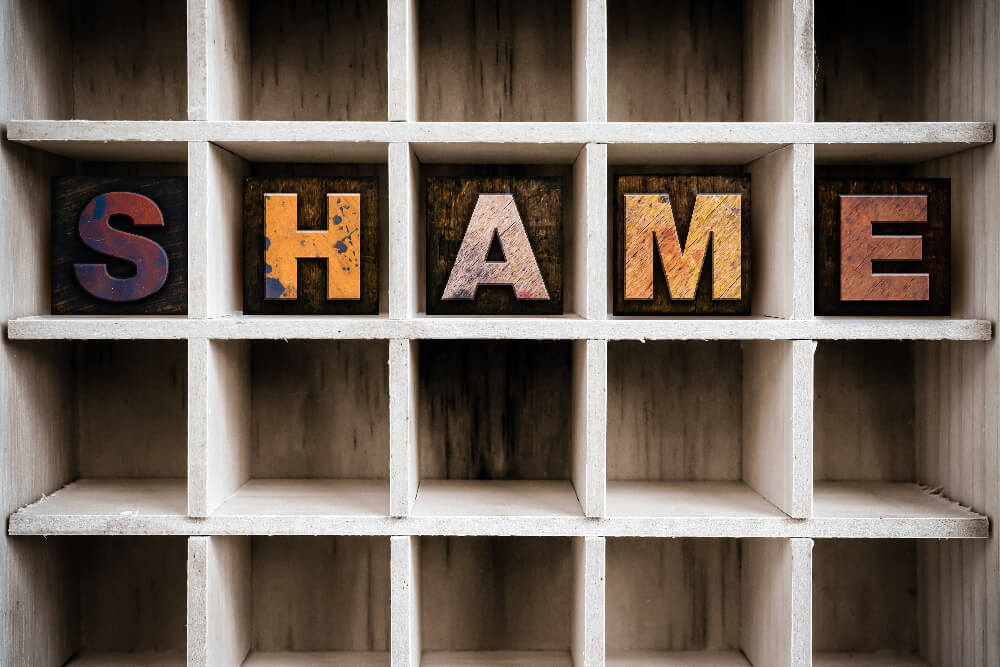Healing shame as a couple offers an opportunity to draw each other closer, to bring a new level of empathy and compassion to a marriage or relationship and to create a more secure, loving bond.
Sounds like a tall order, huh? Indeed, perhaps, but a worthwhile journey.
Shame keeps us from truly experiencing deep connection with another person and from fully experiencing joy. When we don’t feel good about ourselves, we are less likely to affirm others, to reach out to others or to feel compassion and empathy for ourselves.
However, learning shame resilience allows the joy in. Hence, the worthwhile journey. Here, we’re going to discuss how shame limits connection and the path toward healing shame as a couple.
The Power of Shame
Marie* was very controlled by her partner in her last relationship. Now, in her relationship with Devin, she becomes fearful of any signs he could be asserting control or being manipulative. As a child, her alcoholic father was critical and had very strict rules. Marie easily gets emotionally triggered when Devin makes even small requests — that they work on a budget together or when he tries to plan their vacation by making suggestions.
Alice and Jim have begun a negative pattern of arguing over neatness around the house. Jim gets easily upset with Alice when she leaves things around and when she’s not as tidy as he wants. Alice is frustrated because she thinks she’s accommodating Jim the best she can, yet it’s never quite enough.
The problem is that shame stays hidden, so we’re not fully aware of how shame affects us. Here’s the other part of these stories:
Deep down, Marie hides shame that she was not good enough or attractive enough to be an equal partner in her previous relationship. She also lacks confidence from her at-times chaotic childhood. Devin tries to reassure her, but Marie’s fears often lead to arguments and accusations that Devin is asserting control.
Jim was raised by a critical mother, and neatness was one of the ways he would try to get her approval. Though, no matter how he tried, his mother would find fault.
How Shame in Relationships Limits Connection
We can easily see how hidden shame impacts these couples. Unspoken shame has power; as we’ll soon see. Speaking about and sharing our deeper feelings is the weapon that can diminish that power.
Shame in relationships includes:
- One partner putting on a facade or front to protect their image with their partner (and with others)
- Keeping deeper feelings hidden to avoid having the partner or others find out about personal “flaws”
- Connection can be blocked because of the “mask” we wear to avoid being authentic
Understanding “Shame Resilience”
Noted shame researcher Brene Brown, Ph.D., uses the term “shame resilience” to describe how we can combat feelings of shame. And, she says, resilience begins with developing greater empathy toward ourselves and toward others.
And, yes, we begin with ourselves (though as we discuss soon, our partner can help).
We tend to keep shame hidden — we are ashamed of our shame! And, the hiding of shame is what gives it such power. When we learn to face shame head-on and with empathy, we can begin to deflate its impact. “If we can share our story with someone who responds with empathy and understanding, shame can’t survive,” she writes.
Dr. Brown, in her book, “Daring Greatly: How the Courage to be Vulnerable Transforms the Way We Live, Love, Parent and Lead (Gotham/Penguin, 2012), she designates four elements of shame resilience:
- Recognizing shame and understanding its triggers. Learning to recognize when you’re feeling shame and what events evoke these feelings.
- Practicing critical awareness. Becoming able to see whether messages beneath your shame and expectations are realistic, attainable and what you actually want to be
- Reaching out. “Are you owning and sharing your story? We can’t experience empathy if we’re not connecting,” she points out.
- Speaking shame. Talking about shame and asking for what you need from your partner when shame surfaces.
In counseling, Marie shares her feelings with Devin, as well as her deep fears that she’ll lose the relationship. Now, Devin can make sense of her actions — and he can reassure her that their relationship is secure. She can begin to realize he’s not at all like the manipulator she felt shamed by in her previous relationship.
Also in counseling, Jim reveals his shame that lies beneath his demands of neatness in the home. Alice softens, and now it’s clear to her why their arguments can become so heated. With shame out in the open, they can work together healing shame as a couple with loving acceptance and kindness.
Healing Shame as a Couple Builds Connection
Sue Johnson, Ph.D., the leading developer of Emotionally Focused Therapy, points out the problems of keeping shame hidden. “[Brain] scans show that suppression actually heightened activity in the amygdala, ‘fear central’ in the brain.” People become more stressed and tense when we hold back negative emotions.
And, importantly, she notes, “The most functional way to regulate difficult emotions in love relationships is to share them.”
Think back to a time when you shared deep feelings with someone who was able to listen and respond with understanding. You probably felt lighter, a sense of relief. That’s the power of connection and the power of not containing and hiding shame. And, that’s the power of connection and how healing shame as a couple reinforces connection and trust.
Building Self-Compassion
One of the powerhouses of defeating shame is building our personal arsenal to diminish the hold shame can have on us. And, developing self-compassion is a fundamental tool.
A great resource is the work of Kristin Neff, Ph.D., whose work on developing self-compassion is well known. Dr. Neff writes: “Instead of mercilessly judging and criticizing yourself for various inadequacies or shortcomings, self-compassion means you are kind and understanding when confronted with personal failings – after all, who ever said you were supposed to be perfect?”
Self-compassion involves acting with kindness and empathy toward yourself when you are having a difficult time, experience a failure, or notice something you don’t like about yourself. “Instead of just ignoring your pain with a “stiff upper lip” mentality, you stop to tell yourself “this is really difficult right now,” how can I comfort and care for myself in this moment?,” Dr. Neff explains.
Her website, www.self-compassion.org, is rich with information, including a self-test that’s easy and helpful to complete.
Defeating and Healing Shame Together
Let’s look back at our two couples. Marie and Devin can now stand together as a team to work toward healing shame as a couple and create a new level of empathy. Devin asks Marie to let him know when she’s feeling afraid.
They work at talking through her feelings, and Devin learns what triggers her shame, so he can now approach those “land mines” differently. Marie works hard to accept that her fears were developed in painful past experiences. She accepts that those were very challenging times.
Jim begins to accept his shame as driven from his past. As a couple, they have several healing conversations in which Jim sincerely apologizes for his actions and accusations.
Now that Alice has deeper insight into Jim’s behavior, she is able to forgive. They can become partners in defeating shame and building greater compassion for each other.
These couples made it emotionally safe to explore their inner feelings and the emotions beneath their behaviors. They sought counseling because they were stuck in trying to break the cycles of arguing on their own.
Emotionally Focused Therapy authors and trainers Brent Bradley, Ph.D., and James Furrow, Ph.D., in their “Emotionally Focused Couple Therapy for Dummies (Wiley, 2013) (yes, there is a “dummies” book for EFT!) suggest:
- Recognize that shame is often colored by fear — a fear of being vulnerable, of not being fully accepted
- If your partner becomes defensive, understand that shame is an internal battle with oneself. Your partner’s defensiveness may feel personal, so realize it’s not about you.
- Show appreciation for the risks your partner is taking to reveal shame and the courage he or she is showing to step into such a painful place with you.
- Validate your partner’s experience. You don’t need to have gone through his or her pain to understand your partner’s feelings. Keep in mind that your partner’s emotional landscape may be different than your own. Allow them to be your guide by listening with compassion.
Healing shame as a couple is not easy for many. Yet, breaking through the barriers to connection that are the result of hidden shame can lead to new opportunities for closeness and joy together.
* Names and circumstances have been changed to preserve privacy.


 While there are times that this is needed, I’ll give the perspective that I have as a couples counselor on whether you should seek both individual counseling and couples counseling.
While there are times that this is needed, I’ll give the perspective that I have as a couples counselor on whether you should seek both individual counseling and couples counseling. Did you know that counseling for anxiety and relationship issues (as well as a host of other things) can re-wire your brain?
Did you know that counseling for anxiety and relationship issues (as well as a host of other things) can re-wire your brain? I have a really bad habit when I’m trying to stay motivated to change something about my life. It’s something that I recognize does me no good, but it creeps up on me like the dishes and the laundry. I don’t notice it at first, but then suddenly I’m knee-deep. Somehow my optimism about things has dissolved and I have a case of the screw-its. I’m talking about feeling discouraged at the amount of progress I’ve made in my endeavors. Trying to be a better parent and spouse. Trying to do the things that I know are important for my mental and physical well-being. Have you ever worked hard at something, but couldn’t stay motivated because you weren’t seeing any progress? Since I’m a human, I do things that work against my peace of mind. And, since I’m a therapist, I know I didn’t invent this little mind game. In my Lakewood counseling practice I see this all the time.
I have a really bad habit when I’m trying to stay motivated to change something about my life. It’s something that I recognize does me no good, but it creeps up on me like the dishes and the laundry. I don’t notice it at first, but then suddenly I’m knee-deep. Somehow my optimism about things has dissolved and I have a case of the screw-its. I’m talking about feeling discouraged at the amount of progress I’ve made in my endeavors. Trying to be a better parent and spouse. Trying to do the things that I know are important for my mental and physical well-being. Have you ever worked hard at something, but couldn’t stay motivated because you weren’t seeing any progress? Since I’m a human, I do things that work against my peace of mind. And, since I’m a therapist, I know I didn’t invent this little mind game. In my Lakewood counseling practice I see this all the time.